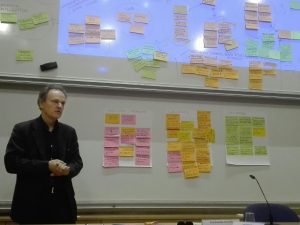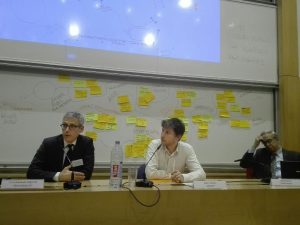THE ACCESSIBILITY WE NEED: Message from CODATU to Habitat III
During
the Habitat III preparatory process, the CODATU Permanent Scientific and Technical Committee (PSTC) proposed to send a Message from CODATU to Habitat III following the one sent from CODATU to Habitat II in 1996.
On April 13th 2016, CODATU and CNAM organised the “HABITAT III: The Accessibility We Need” workshop in Paris wishing to promote exchanges between experts towards the urban mobility role with the aim of advancing discussions around Habitat III and the New Urban Agenda preparatory process.
The CODATU’s Message to HABITAT III focuses on the “Accessibility we need” as a basic right of city residents. In doing so it recognizes that access should not be unfettered, but designed to minimize impacts on safety, energy and the environment. The “HABITAT III: The Accessibility We Need” workshop aimed to let CODATU share and explore the vision of its various members; this position paper “message” represents a shared vision between the different stakeholders and goes beyond the term ‘sustainable’ by offering concrete solutions to real challenges.
This article provides a report of the workshop.
Why should we talk about accessibility?
The opening session was chaired by Ela Babalik-Sutcliffe, Ali Huzayyin and Lorenza Tomasoni.
Firstly, Ela Babalik-Sutcliffe introduced the session with a presentation analysing the definitions of accessibility and mobility that are wrongly often used without a clear distinction (download slides). On the one hand, mobility concerns the state of being mobile, the ability to move or to be moved, it focuses on the means of travel and it represents the potential for movement as getting from one place to another. On the other hand, accessibility concerns the way of approaching or entering a space and focuses on the end, the destinations, as well as the means of travel. Accessibility impacts livelihood because planning for good accessibility can inherently improve mobility. Similarly, Ali Huzayyin (download slides) added other dimensions of accessibility considering it is a key challenge that makes the link between urbanisation and mobility and should be more tackled in the New Urban Agenda.
What place for accessibility in the New Urban Agenda?
The event was organised along two key streams sessions. During the morning session, three working groups (WGs) focused on accessibility in the envisaged Habitat III policies highlighting problems and challenges to include int the New Urban Agenda .
- Group 1: Accessibility and people– Leaded by Valérie Ongolo-Zogo, Professor at the Yaoundé University (Cameroun) and Eric Huybrecht, Architect-Urban Planner, IAU-IDF
- Group 2: Accessibility and governance– Leaded by Ela Babalik-Sutcliffe Associate Professor at the Middle East Technical University (Ankara) and Marie Molino, Project manager, GART
- Group 3: Accessibility and planning–Leaded by Benjamin Michelon, Associate Professor and Project Manager, Paris Est University Marne-la-Vallée and Groupe Huit and Thierry Delobel, Project Manager, Transitec
 In the afternoon session, after analysing together the morning conclusions during a knowledge café, participants worked on proposals for concrete actions to implement accessibility we need related to future directions.
In the afternoon session, after analysing together the morning conclusions during a knowledge café, participants worked on proposals for concrete actions to implement accessibility we need related to future directions.
Participants were invited to propose each three problems and three solutions on “the accessibility we need” aiming to define concrete proposals for the New Agenda Urbain and for the CODATU’s Message to HABITAT III.
Habitat III: it is time to implement!
 In the closing session, Yves-Laurent Sapoval, member of the Bureau Habitat III, made a short presentation on the New Urban Agenda role and responsibilities towards countries’ sustainable development. Latter, Julien Allaire, explained “Mobilise Your City” the initiative, launched during the COP21, that aims at supporting 100 developing and emerging cities local governments in their efforts to plan sustainable urban mobility towards healthier, better planned, more inclusive, low carbon and liveable cities.
In the closing session, Yves-Laurent Sapoval, member of the Bureau Habitat III, made a short presentation on the New Urban Agenda role and responsibilities towards countries’ sustainable development. Latter, Julien Allaire, explained “Mobilise Your City” the initiative, launched during the COP21, that aims at supporting 100 developing and emerging cities local governments in their efforts to plan sustainable urban mobility towards healthier, better planned, more inclusive, low carbon and liveable cities.
Prof. Ali Huzayyin, co-president of the CODATU Permanent Scientific and Technical Committee (PSTC), presented the key elements the PSTC had already identified for the CODATU’s Message to HABITAT III and explained how they were in line with the thematic WGs findings.
